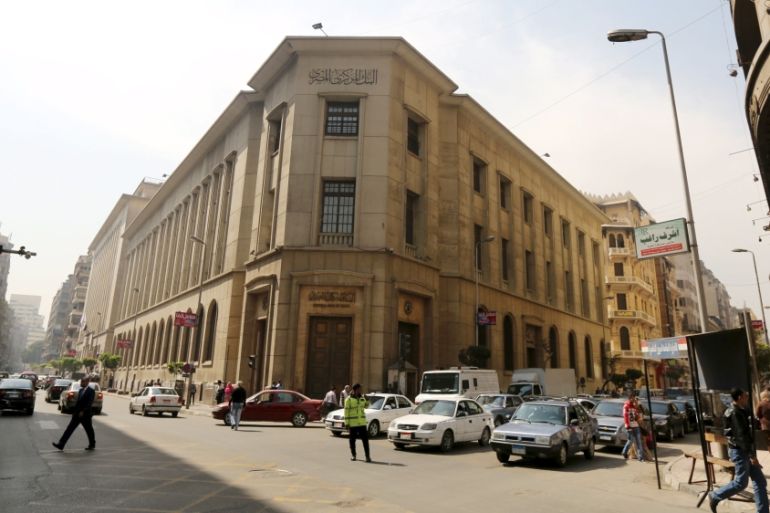Egypt’s currency devaluation fuels debate
Announcement comes as Cairo grapples with a moribund economy on a downward spiral since the 2011 January uprising.

Concerns are intensifying over Egypt’s stumbling economy after the country’s central bank devalued the Egyptian pound by 13 percent in an effort to resuscitate it.
In an attempt to ease a US dollar shortage that has put pressure on the economy, the Central Bank of Egypt this week set the Egyptian pound (EGP) at 8.85 per US dollar. Before the announcement, the exchange rate stood at 7.73.
Keep reading
list of 4 itemsRussia’s Putin eyes greater support from China for Ukraine war effort
India-Iran port deal: A gateway to Central Asia or a geostrategic headache?
India’s income inequality widens, should wealth be redistributed?
The central bank has further said it plans to meet a $25bn foreign-reserves goal by the end of 2016.
Last month, the bank put Egypt’s foreign reserves at $16.5bn, a sharp contrast to 2011 when foreign reserves were estimated at $36bn – before the January 25 uprising began.
The devaluation has left analysts divided over the possible consequences.
Amr Adly, an Egyptian scholar at the Carnegie Middle East Centre, says the move is cosmetic and unlikely to help the economy.
|
|
| Egyptian surveillance: Calls for governments to come clean |
“The whole idea is that they’re trying to gain time, hoping that the global economy will show signs of a recovery as a whole in the coming years,” he said.
The announcement by the central bank is also seen as an attempt to curb the black market’s currency trading, as well as introducing flexible exchange rates to attract more foreign investment.
“I don’t see any positives. It’s not a strategy that they are using to achieve something. They are reacting to a crisis,” Adly told Al Jazeera.
“Their main bet is on bringing down imports. I don’t see something major out of it.”
He said unless there were other factors that bring in foreign exchange, the devaluation would “not have a positive impact”.
On the other hand, Jean-Paul Pigat , a senior economist at Emirates NBD, thinks some positives may result from a cheaper pound.
“That devaluation will be a positive catalyst to facilitate capital flows in the short term,” he was quoted in the UAE’s National newspaper as saying.
David Butter, a Middle East analyst at the London-based Chatham House, told Al Jazeera the Egyptian market will look “more attractive” to those who perceived the pound as overvalued before.
“A combination of a reasonable exchange rate and higher interest rates could trigger a return of foreign banks into the market,” he said.
“I don’t think there will be a flood, I think it’ll be a cautious tipping the toe in at this point.”
Others also discussed a rise in prices because of Egypt’s dependence on imported goods.
“The cost of the devaluation will also be felt on the fiscal side as food and fuel subsidies will cost more,” said Raza Agha, chief economist of the Middle East and North Africa at VTB Capital.
Since a lot of these imports have already seen an inflation increase, it is unlikely that the price rise will be noticeably high.
READ MORE: Europe centre-rightists reach out to MENA countries
Political and security uncertainties have hit major foreign currency generating sectors such as Egypt’s tourism industry since the 2011 revolt that brought down President Hosni Mubarak.
Late last year, a Russian airliner was shot down in Egypt’s Sinai, killing all 224 people on board.
The crash, which was claimed by the Islamic State of Iraq and the Levant (ISIL, also known as ISIS), led Russia to suspend all flights to Egypt.
The Netherlands, the UK, Ireland and Germany also suspended flights to and from the tourist resort of Sharm el-Sheikh.
The crash dealt an additional blow to Egypt’s struggling tourism industry, with revenues reportedly declining by $1.3bn following the crash.
Butter argued that while the devaluation will make tourism cheaper for some foreign tourists, there are other concerns.
“It makes travelling to Egypt cheaper, but the reasons why people are not coming to Egypt have more to do with their worries about terrorism – and that’s a basic problem,” he told Al Jazeera.
“That’s several billions of dollars that would’ve come into that system that aren’t.”
Al Jazeera contacted the central bank for comment, but a person who answered the phone hung up.
![Gulf state investment in Egypt is likely to slow down dramatically amid plummeting oil prices [AP]](/wp-content/uploads/2016/03/4ee0013ebfbe4f39a74bc602ecf05ff3_18.jpeg)
Last year, Arab Gulf states pledged about $12bn in investments for Egypt at the international economic summit held in Sharm-el-Sheikh.
It is unclear how much of the pledges made it into Egypt.
With the steep drop in oil prices dramatically affecting revenues of the oil-rich Gulf, similar pledges are unlikely in the years to come.
Additionally, the International Monetary Fund has reported that the global economy has weakened further this year after slowing “unexpectedly” at the end of 2015.
“You’re having a slowdown in China, a recession in Europe, and a reduction in oil prices that has hit the Gulf hard,” Adly said.
“These are the main partners that Egypt depends on for capital in-flow, for exporting goods, as well as receiving remittances and receiving tourists. All of these are global factors.”
Follow Mohamed Hashem on Twitter: @mhashem_